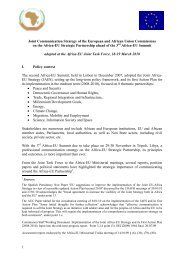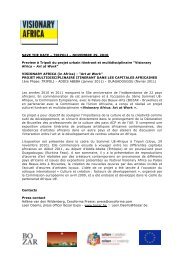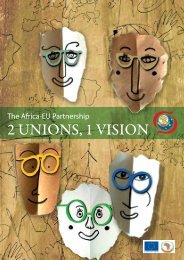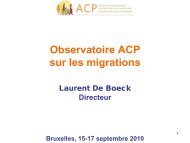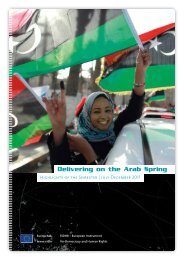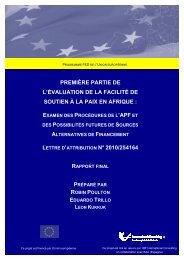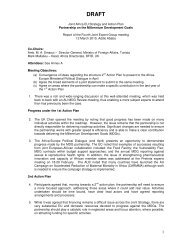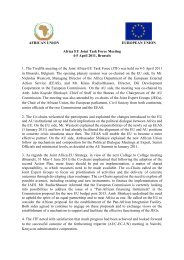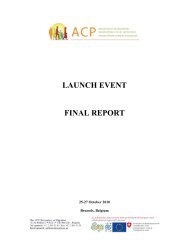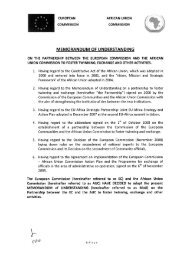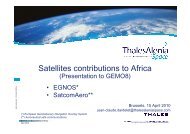part 1 of the african peace facility evaluation - European ...
part 1 of the african peace facility evaluation - European ...
part 1 of the african peace facility evaluation - European ...
You also want an ePaper? Increase the reach of your titles
YUMPU automatically turns print PDFs into web optimized ePapers that Google loves.
The costs covered by ATHENA include <strong>the</strong> maintenance <strong>of</strong> <strong>the</strong> operational headquarters,<br />
investments in <strong>the</strong> infrastructure made to support <strong>the</strong> operation, medical services, as well as<br />
‘Nation Borne Costs’ which include lodging, fuel, and similar expenses linked to <strong>the</strong><br />
mobilisation <strong>of</strong> national contingents. All <strong>the</strong> o<strong>the</strong>r costs related to deployed personnel<br />
(allowances, salaries...) are borne individually by <strong>the</strong> State contributing to <strong>the</strong> operation in<br />
question. ATHENA does not intervene in <strong>the</strong> way each contributing State manages its<br />
operational costs. Never<strong>the</strong>less, <strong>the</strong> Special Committee may decide that <strong>the</strong> administrative<br />
management <strong>of</strong> certain expenditures, while remaining <strong>the</strong> responsibility <strong>of</strong> <strong>the</strong> Member State<br />
concerned, should be entrusted to ATHENA;<br />
ATHENA has shown flexibility, in that <strong>the</strong> mechanism has evolved over time: originally medical<br />
costs, transport etc. were not covered;<br />
ATHENA has been designed to become a very flexible, effective and efficient instrument for<br />
military operations in <strong>the</strong> field. It has <strong>the</strong> necessary legal identity to hold a bank account or<br />
property, to sign contracts and to be a <strong>part</strong>y to legal proceedings. It is not pr<strong>of</strong>it making. Any<br />
payment from ATHENA´s account only requires <strong>the</strong> joint signatures <strong>of</strong> <strong>the</strong> administrator and<br />
<strong>the</strong> accounting <strong>of</strong>ficer;<br />
Any joint action by which <strong>the</strong> Council decides that <strong>the</strong> EU will conduct a military operation, and<br />
any joint action or decision by which <strong>the</strong> Council decides to extend a EU operation, shall<br />
contain a reference amount for <strong>the</strong> common costs <strong>of</strong> this operation. The administrator shall<br />
evaluate this amount for <strong>the</strong> planned period – meaning that budgets are determined annually,<br />
which is not a definition <strong>of</strong> long-term ‘predictable funding’ as compared to <strong>the</strong> current<br />
objectives <strong>of</strong> <strong>the</strong> APF;<br />
ATHENA allows <strong>the</strong> EU MS to conclude ad hoc administrative arrangements with third States<br />
indicated by <strong>the</strong> Council as potential contributors to a specific EU operation, or as contributors<br />
to EU operations in general.<br />
This financial mechanism was established for military operations, inspired by NATO procedures, for<br />
<strong>European</strong>-led PSOs. Because <strong>of</strong> <strong>the</strong>se features, ATHENA might be an inspiration to make APF a<br />
more effective and faster instrument to support PSOs. APF financial decisions might be taken more<br />
quickly. However, for A<strong>the</strong>na to serve as an operational model in Africa, substantial modifications<br />
would be needed to <strong>the</strong> original Decision. It should be also recalled that <strong>the</strong> APF has a limited budget<br />
for PSOs and that an “A<strong>the</strong>na-Africa” mechanism might be needed to replace APF PSO support, when<br />
or if, funding runs out. That said, it is questionable whe<strong>the</strong>r <strong>the</strong> EU member states have <strong>the</strong> political<br />
and financial interest to create such an additional mechanism.<br />
An oversight committee could be created for A<strong>the</strong>na-Africa (or A<strong>the</strong>na-APF), made up <strong>of</strong> AU/RECs<br />
toge<strong>the</strong>r with <strong>the</strong> EU and which would respect principles <strong>of</strong> African ownership and Africa-EU<br />
<strong>part</strong>nership. However, <strong>the</strong>se changes would not solve one <strong>of</strong> <strong>the</strong> main problems for APF: <strong>the</strong> fact that<br />
most African armies lack sound administrative management systems. When efficient management<br />
systems must interact with o<strong>the</strong>r inefficient management systems, <strong>the</strong> interaction becomes inefficient.<br />
b. Differentiate between <strong>the</strong> various APF Components:<br />
The EU should separate <strong>the</strong> three APF components: PSOs, capacity building and ERM, to set up <strong>the</strong><br />
best decision-making procedures for each <strong>of</strong> <strong>the</strong>m.<br />
IFS INFORMATION PROCEDURE<br />
In case <strong>the</strong> Commission retains its competence on APF, <strong>the</strong> <strong>evaluation</strong> recommends introducing <strong>the</strong><br />
IfS information procedure using written information notes from DEVCO to inform <strong>the</strong> PSC in Brussels<br />
and just give MS 48 hours to object, but without requiring written approval or any formal meeting <strong>of</strong><br />
Council committees or groups. This procedure is <strong>part</strong>icularly relevant for <strong>the</strong> non-PSO funding <strong>of</strong> <strong>the</strong><br />
APF.<br />
Page 35 <strong>of</strong> 49




